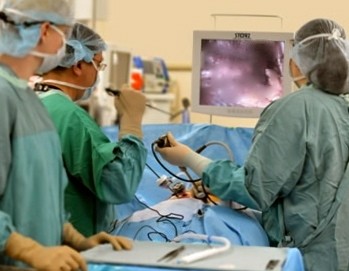1 in 4 MA Nurses Report Patient Death Resulting From Understaffing
Friday, June 06, 2014

Commissioned by the Massachusetts Nurses Association, the statewide survey of bedside registered nurses (RN) reported that hospitals are understaffing their RN population which is leading to a lack of patient care.
“These practices are absolutely dangerous and unsafe,” said David Schildmeier, Director of Public Communications at Massachusetts Nurses Association. “The quality of care for patients has deteriorated because there are fewer nurses in hospitals and more patients to care for.”
According to the survey, the understaffing of nurses has been leading a lack of patient care. Schildmeier says that in one situation, a newly graduated nurse in a Massachusetts hospital was made to care for nine patients during one shift (he says that in most cases, nurses should be taking care of 2-3 at most).
Survey Results
The survey conducted by the Massachusetts Nurses Association is jam packed with statistical evidence saying that more nurses are needed throughout all of Massachusetts’ hospitals.

“Worcester hospitals specifically rank poorly in terms of patient education and readmission of patients, which means that a patient was treated for something and then had to come back for the same reason because the illness was not properly treated the first time around,” said Schildmeier. “Say for example a patient has diabetes. The patient may be rushed out of the hospital without being properly educated, meaning that they may be readmitted later because of a complication that wouldn’t have happened if they were properly educated the first time around.”
High Quality Care
Although the recently released study states that more nurses are needed to combat this growing trend of lack of patient care, advocates for hospitals are saying that the study lacks credibility because Massachusetts has consistently ranked toward the top in the nation in terms of healthcare.
According to the Massachusetts Hospital Association, the claims are unwarranted because of a recently released report from the Commonwealth Fund, which rank Massachusetts second overall in the nation in terms of healthcare.
“No federal and state government agency that routinely monitors and licenses hospitals for performance or quality of care has raised concerns on issues that the union makes claims about,” said the Hospital Association in a statement. “There is no evidence to support the union’s claims regarding patient safety. But there is evidence that the quality of patient care in Massachusetts hospitals is of high quality.”
When reached out for comment, St. Vincent Hospital preferred not to comment on the issue and UMass Memorial Medical Center referred to the same opinion shared by the Massachusetts Hospital Association.
Legislative Action

Under the legislation, there would be established safe maximum limits on nurses’ patient assignments, while also providing the flexibility to adjust staffing based on patient needs. The legislature has until July to act on the measure, or the measure will go on the ballot in November.
“It is unacceptable that erratic staffing decisions lead to medical errors, complications, readmissions and death,” said State Representative Denise Garlick (D-Needham), who co-sponsored H.1008. “Patients in Boston and the Berkshires, teaching hospitals and community hospitals, union and non-union facilities need and deserve quality care. All the work of the Legislature, in this decade, on access and cost containment fails if patients do not receive safe, quality care.”
While the bill currently has a lot of support, it also has a lot of opposition, including both the Massachusetts Hospital Association and the Massachusetts Medical Society. While in support of the concept of adequate nursing staff levels, the Massachusetts Medical Society says that statewide regulation is unnecessary.
“In this case, we are not convinced that an across-the-board ‘one size fits all’ staffing ratio is a useful approach,” said the Massachusetts Medical Society in a prepared statement. “On an individual basis, each patient deserves the best care as determined by that patient’s caregiver. Just as each caregiver brings different experiences to patients, each hospital provides varied clinical, physical plant and technological resources to its patients.”
Related Articles
- New: Central Mass Nurses Nominated for Nurse of the Year
- Nurses Picket UMass Memorial Over Staffing + Pension Cuts
- GoLocalTV: Nurses Picket UMass Memorial
- NEW: Nurses Union Files Unfair Labor Charges Against UMass Memorial
- UMass Memorial and Nurses Union Clash Over “Dangerous Mismangement”
- Lack of Worcester School Nurses Putting Children at Risk
- Miriam Hospital’s Nurses Earn Prestigious National Honor
- Appreciation Week: Thanking Teachers and Nurses
- NEW: Warren Speaks to Mass. Nurses About Investing in Education
- John Monfredo: Appreciation Week: Thanking Teachers and Nurses
- Local Nurses Say Hospitals “Skirting the Law”
- NEW: UMass Memorial Nurses to Hold One-Day Strike
- UMASS Memorial/Hahneman Nurses Settle, University Nurses Pending
- UMass Memorial Univ. Campus Nurses Strike Still Looming
- NEW: No Strike—UMass Memorial and Nurses Reach Agreement
- John Monfredo: May is the Month To Remember Our Teachers + Nurses
- Nurses to Voice Mandatory Overtime Concerns Today at State House
- NEW: MA Nurses Association Backs Lynch in U.S. Senate Race
- UMass Memorial Nurses Prepared to Strike
- NEW: UMass Memorial Nurses Vote to Strike
- Central Mass Nurses Up in Arms Over Flu Mask Policy




Follow us on Pinterest Google + Facebook Twitter See It Read It